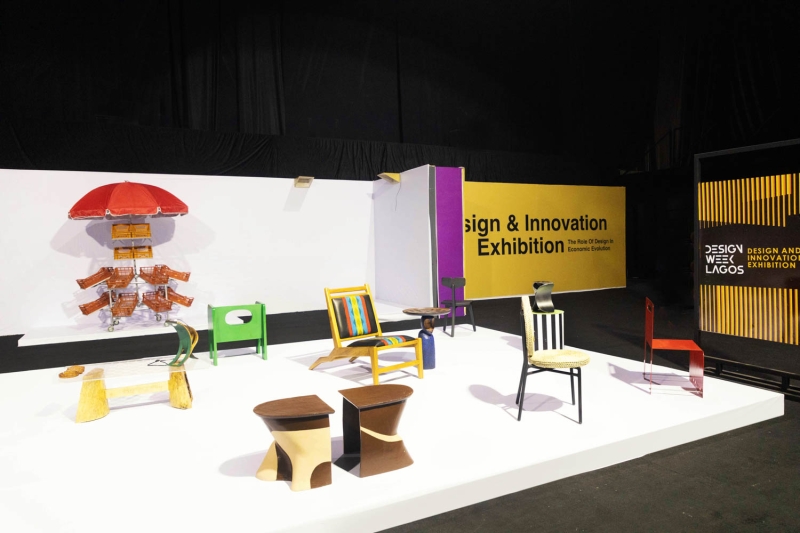Contents
- 1 Explore Highlights From Design Week Lagos 2024
- 1.1 1. Design Week Lagos Student Competition and Workshop
- 1.2 The Siga Chair by Ronke Ladipo
- 1.3 V1-C and ite chair by Temitope El-shabazz
- 1.4 Ulaku finds by Ugonna Eronini
- 1.5 Aro by Antony Oyebode
- 1.6 The Scissors Table by Biola Olorunmo
- 1.7 The Dagin Arewa Chair by Aisha Karanga
- 1.8 Jakuta by Olamide Jinadu
- 1.9 Apọ by Athanasius Akinwale Johnson
Front view of the exhibitor’s space.
The best word to describe Design Week Lagos 2024, which recently wrapped, is simply “cultural.” Though that wasn’t the theme exactly, exhibitors seemed largely inspired by their ancestry, or narratives that are authentically African. This was obvious in the names the designers used for their projects and collaborations, and in the way they proudly explained their work to crowds during the event. Overall, this year’s show centered on “The Role of Design in Economic Evolution,” sparking numerous conversations around how design can boost the continent’s economic growth, especially in Nigeria where inflation continues to leave a lasting impact. From a sustainable chair that takes its form from cigars to a coffee table that nods to open-fire stoves, take a look at standout moments from Design Week Lagos 2024.
Explore Highlights From Design Week Lagos 2024
1. Design Week Lagos Student Competition and Workshop
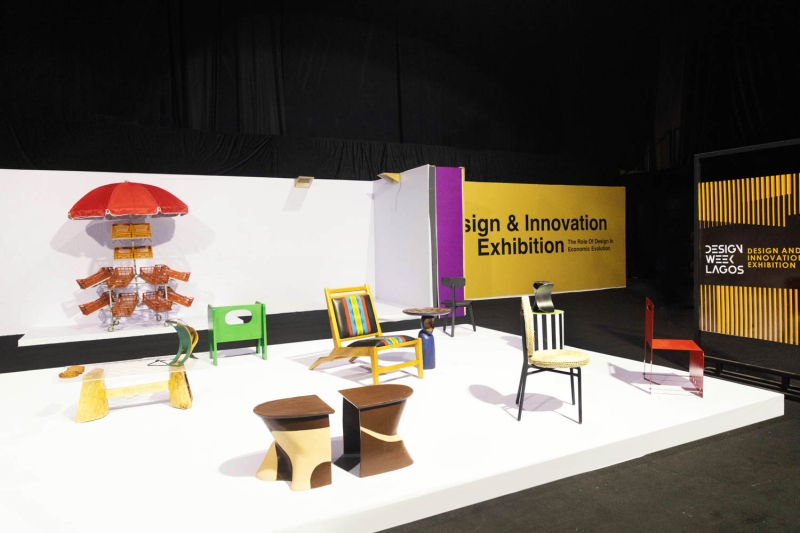
Front view of the exhibitor’s space.
With many emerging talents in the design scene, the organizers at the Design Week Lagos decided to host a design competition and workshop for students across the country. Showcasing innovation and optimism for the future, the competition served as a highlight at this year’s fair, with three student winners taking home prizes for their projects.
The Siga Chair by Ronke Ladipo
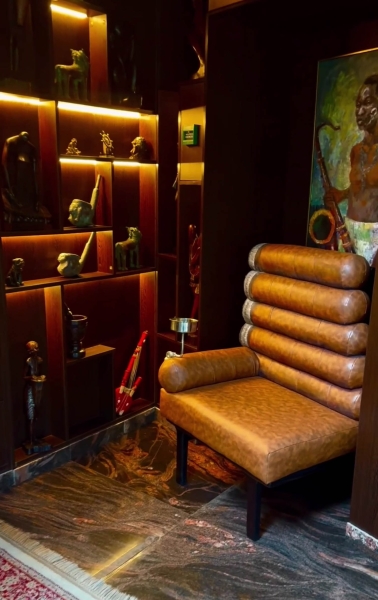
The Siga Chair by Ronke Ladipo.
How do you make relaxation feel so chic? The Siga Chair by designer Ronke Ladipo answers that question perfectly. The chair, inspired by the arrangement of cigars inside a pack, is composed of an elegant stack of large cigar-like structures. Ladipo incorporates elements of sustainability, using recycled leather. The chair also possesses a stainless steel ashtray attached to its side, replicating the shiny effect cigars have. “The process of creating it was challenging, but I was excited to bring the vision to life,” Ladipo says. “As soon as I created the prototype, I shared it with a few friends and the response I received was positive. They loved the concept, and it was clear I had created something truly extraordinary!”
V1-C and ite chair by Temitope El-shabazz
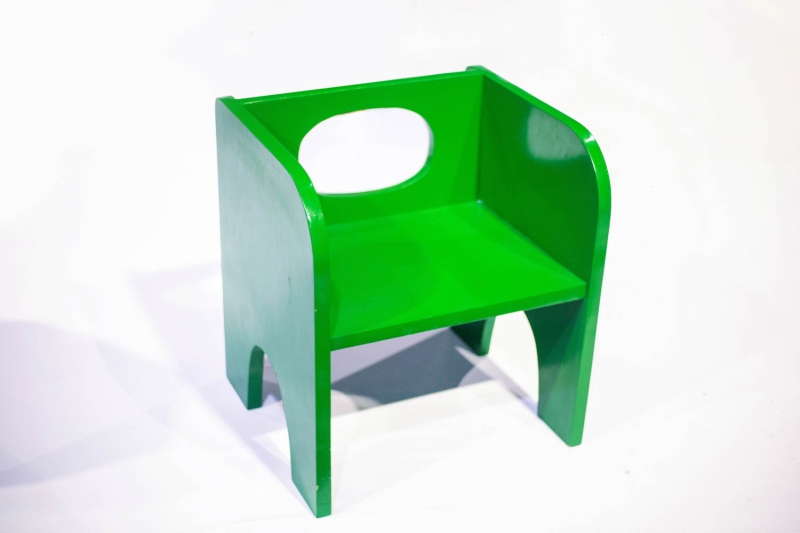
V1-C by Temitope El-shabazz.
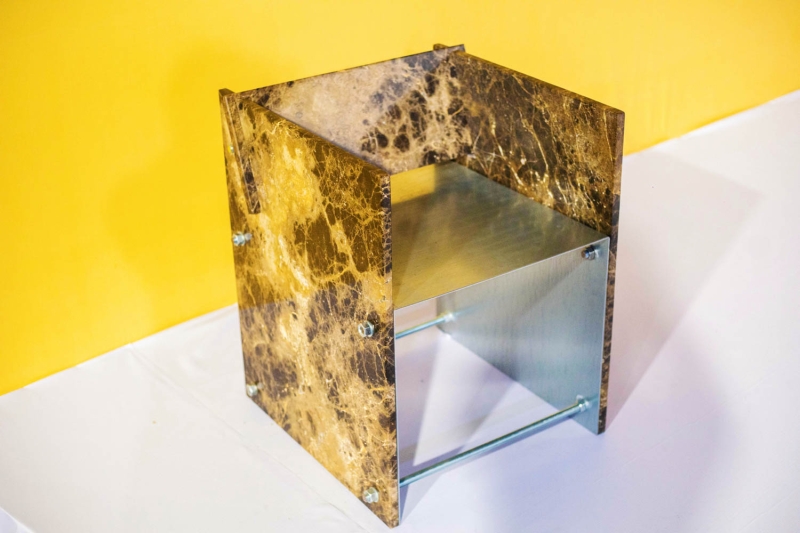
ite chair by Temitope El-shabazz.
Designer Temitope El-shabazz from Heph Co created two versions of his famous chair. First was the V1-C, a vibrant green colored chair inspired by the balance between minimalism, organic forms and his love for nature. The second was the ite chair, a collaboration with Julius Berger that blends luxury and craftsmanship. The ite chair is made from marble and reinforced with a robust galvanized iron framework. While both products stand on their own, together they caught even more attention at Design Week Lagos 2024. “I’m not trying to create new forms,” El-shabazz says. “I’m trying to redefine old forms using familiar materials in forms that are yet to be explored and often deemed impossible. Function is a popular topic, but empathy is often confined within the limits of physicality. I’m trying to heal the heart (or soul), or at least mend it. Perhaps even preserve it. It’s a grandiose idea; but if you think about it deeply, for a creator, that’s all they truly want to do.”
Ulaku finds by Ugonna Eronini
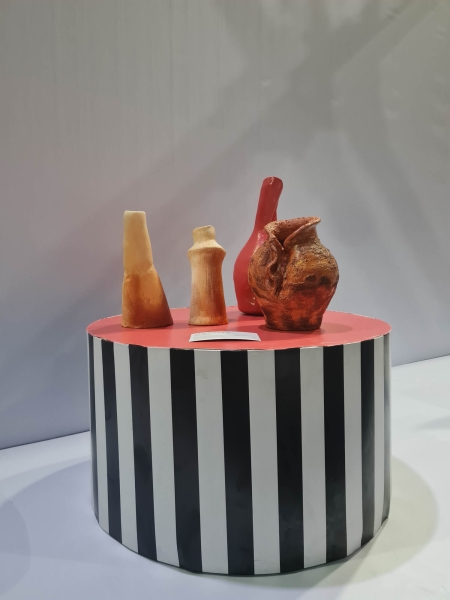
Ulaku finds by Ugonna Eronini.
Ulaku translates to house of wealth and in this ceramic design, Ugonna Eronini takes viewers to Southeast Nigeria where she explores different textures using scrap pottery pieces that are cracked during the firing process. The designs feature four clay pieces, including a pot and a jug, which she mentions is an ode to the Wabi-Sabi mindset from Japan. “We wanted these pieces to be timeless, like the people and places we call home, by creating a vintage-aged feel and look that required dedicated hours of meticulous care and labor to achieve,” Eronini says. “Each product in this category required at least 10 hours of work. Each piece in this set, although identical, is completely different and cannot be replicated.”
Aro by Antony Oyebode
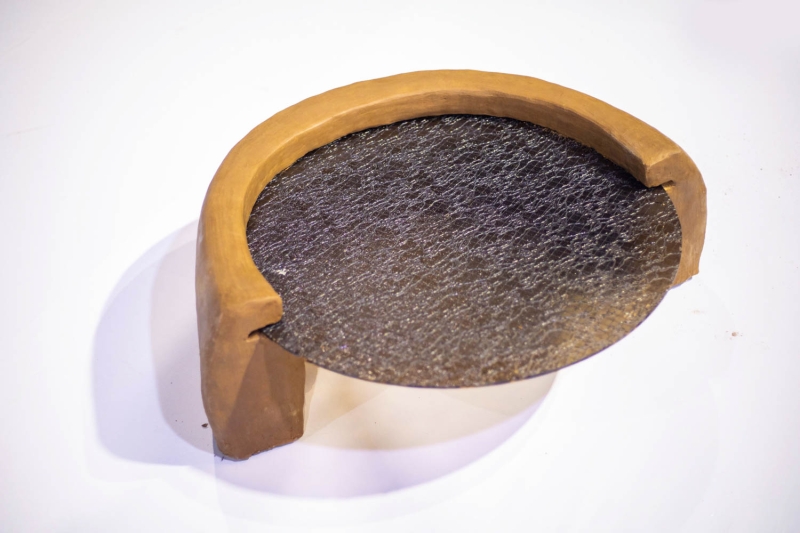
Aro by Antony Oyebode.
For Design Week Lagos 2024, designer Antony Oyebode wanted to spark memories of cooking so he created a coffee table called Aro, which draws inspiration from traditional cooking stoves. The base of the product is made of clay and the tabletop is made from rippled glass, merging cultural heritage with modern aesthetic. But this project also represents the dynamism of fire. Here, he mentioned that incorporating an undulating surface and recycled glass tabletop mirrors the visual movement of heat waves rising from a clay base, adding a tactile and sensory dimension to the piece. “I wanted the coffee table to not only be functional, but also serve as a statement piece that fosters a deeper connection to Yoruba culture,” he says.
The Scissors Table by Biola Olorunmo
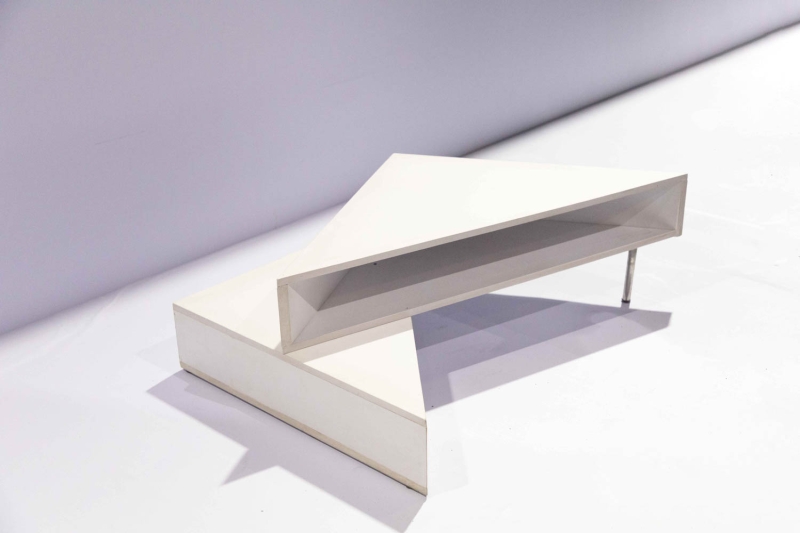
The Scissors Table by Biola Olorunmo.
“How do I create a design from an everyday object?” was the question Biola Olorunmo asked himself before he created The Scissors Table. The product is as descriptive as its sounds, featuring two wood cutouts in contrasting positions to make the piece look like a pair of scissors. “This design, which I call Shear Elegance, showcases how utilitarian tools can inspire sculptural furniture,” says Olorunmo. “The table features two intersecting planes that mimic scissor blades, creating a dynamic, split-level surface. A monochromatic finish emphasizes its bold geometric form, while an asymmetrical layout and cantilevered edge provide visual intrigue.”
The Dagin Arewa Chair by Aisha Karanga
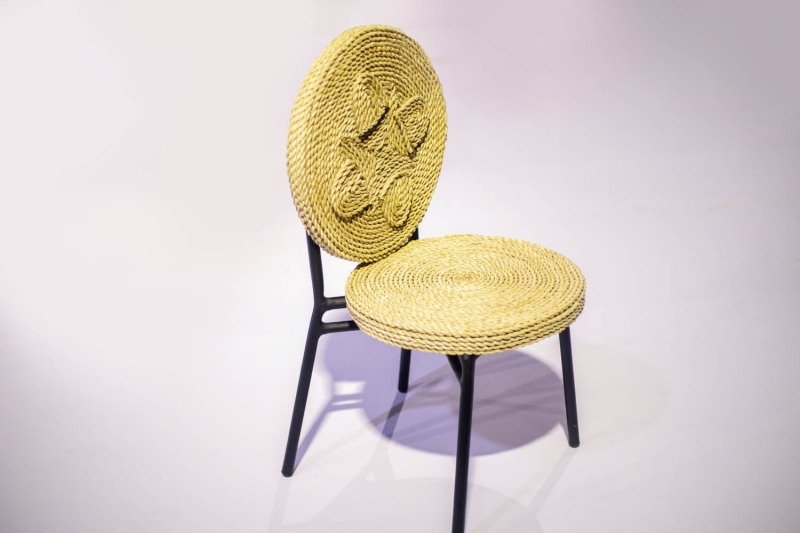
The Dagin Arewa Chair by Aisha Karanga.
Using locally sourced materials is part of Aisha Karanga’s design philosophy and this year she did so using dried raffia to make a rattan chair that she called The Dagin Arewa Chair. The product also incorporated motifs found in her culture, which transforms the product into an art piece that can fit both indoors and outdoors.
Jakuta by Olamide Jinadu
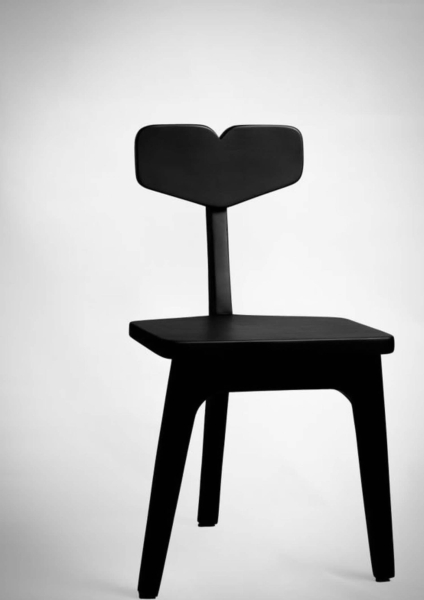
Jakuta by Olamide Jinadu.
Who gets inspired by mythology? Olamide Jinadu retold the folklore of Sango, the Yoruba God of fire and thunder who is renowned for his hot-temper. She exhibited a chair titled Jakuta, which is another name for Sango. The black chair was made of mahogany and cedar wood and is intended to represent the social construct between human nature and that of the supreme deity. “The Jakuta chair is the first product in an ongoing series where I contemplate Yoruba traditional religion through design,” Jinadu says.
Apọ by Athanasius Akinwale Johnson
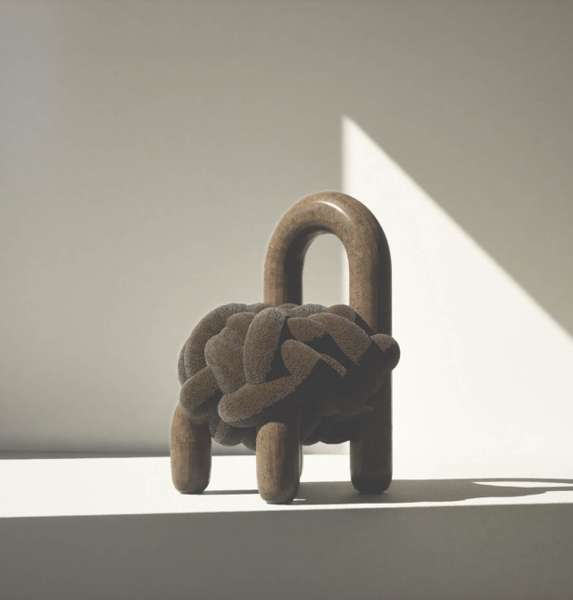
Apọ armchair” by Athanasius Akinwale Johnson.
Athanasius Akinwale Johnson’s inspiration comes from culture. That is why he made the Apọ armchair, a chair inspired by the concept of multitude. Apọ means “we are many” in Yoruba, and he combined different materials to create the product including woods, yarns that he weaves together to create the concept of multitude, and locally sourced fabric like akwete and aso oke.

